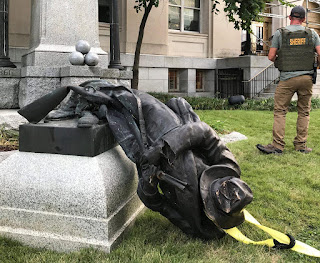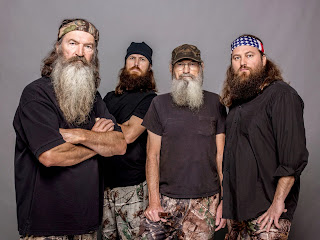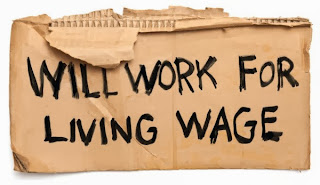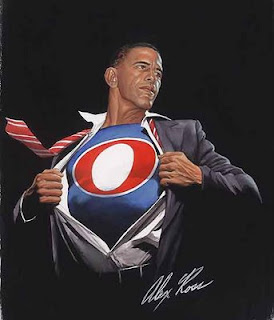"GET OVER IT"??
HOW CAN WE GET OVER THE PREMEDITATED MURDER OF A HIGH COURT JUSTICE??
Not many Supreme Court justices become famous, but Antonin Scalia is one of the few. Known as "Nino" to his friends and colleagues, he is one of the most brilliant and combative justices ever to sit on the court and one of the most prominent legal thinkers of his generation.
He first agreed to talk to 60 Minutes correspondent Lesley Stahl last spring about a new book he's written on how lawyers should address the court. But over the course of several conversations, our story grew into a full-fledged profile - his first major television interview - including discussions about abortion and Bush v. Gore.
At 72, Justice Scalia is still a maverick, championing a philosophy known as "orginalism," which means interpreting the Constitution based on what it originally meant to the people who ratified it over 200 years ago.
Scalia has no patience with so-called activist judges, who create rights not in the Constitution - like a right to abortion - by interpreting the Constitution as a "living document" that adapts to changing values.
Asked what's wrong with the living Constitution, Scalia tells Stahl, "What's wrong with it is, it's wonderful imagery and it puts me on the defensive as defending presumably a dead Constitution."
"It is an enduring Constitution that I want to defend," he says.
"But what you're saying is, let's try to figure out the mindset of people back 200 years ago? Right?" Stahl asks.
"Well, it isn't the mindset. It's what did the words mean to the people who ratified the Bill of Rights or who ratified the Constitution," Scalia says.
"As opposed to what people today think it means," Stahl asks.
"As opposed to what people today would like," Scalia says.
"But you do admit that values change? We do adapt. We move," Stahl asks.
"That's fine. And so do laws change. Because values change, legislatures abolish the death penalty, permit same-sex marriage if they want, abolish laws against homosexual conduct. That's how the change in a society occurs. Society doesn't change through a Constitution," Scalia argues.
He's been on a mission as an evangelist for originalism, at home and around the world.
For example, he visited the Oxford Union in England.
"Sometimes people come up to me and inquire, 'Justice Scalia, when did you first become an originalist?' As though it's some weird affliction, you know, 'When did you start eating human flesh?'" Scalia told students, who replied with laughter.
They may be laughing, but in the U.S. Scalia is a polarizing figure who invites protestors and picketers. There haven't been many Supreme Court justices who become this much of a lightening rod.
"I'm surprised at how many people really, really hate you. These are some things we've been told: 'He's evil.' 'He's a Neanderthal.' 'He's going to drag us back to 1789.' They're threatened by what you represent and what you believe in," Stahl remarks.
"These are people that don't understand what my interpretive philosophy is. I'm not saying no progress. I'm saying we should progress democratically," Scalia says.
Back at the Oxford Union, Scalia told the students, "You think there ought to be a right to abortion? No problem. The Constitution says nothing about it. Create it the way most rights are created in a democratic society. Pass a law. And that law, unlike a Constitutional right to abortion created by a court can compromise. It can...I was going to say it can split the baby! I should not use... A Constitution is not meant to facilitate change. It is meant to impede change, to make it difficult to change."
But his critics argue that originalism is a cover for what they see as Scalia's realintention: to turn back some pivotal court decisions of the 1960s and 70s.
He's been labeled a "counterrevolutionary."
"A counterrevolutionary!" Scalia reacts. "Sounds exciting."
The critics say his aim is to undo Roe v. Wade and affirmative action, and to allow more religion in public life.
"The public sense of you is that [you] make your decisions based on your social beliefs," Stahl says, with Scalia shaking his head. "That is the perception."
"I'm a law-and-order guy. I mean, I confess I'm a social conservative, but it does not affect my views on cases," Scalia says."
His philosophy has occasionally led him to decisions he deplores, like his upholding the constitutionality of flag burning, as he told a group of students in Missouri.
"If it was up to me, I would have thrown this bearded, sandal-wearing flag burner into jail, but it was not up to me," Scalia told the students.
To Scalia, flag burning was protected by the founding fathers in the First Amendment, which is his only criterion, he says, under originalism.
"But do you respect that there is another way to look at this?" Stahl asks.
"You know the story of the Baptist preacher who was asked if he believed in total-immersion baptism? And he said, 'Believe in it? Why I've seen it done!' I have to say the same thing about your question. There must be other views because I've seen them," Scalia says.
"Yeah, but do you respect them? You don't, do you?" Stahl asks.
He's talking about some of his fellow justices, like Ruth Bader Ginsburg, a liberal who is - and this never ceases to surprise people - one of Scalia's best friends, both on and off the court.
To Ginsburg, the Constitution evolves and should reflect changes in society; that going back to what was meant originally when they wrote, for instance, "We the People," makes little sense.
"Who were 'We the People' in 1787? You would not be among 'We the People.' African Americans would not be among the people," Ginsburg tells Stahl.
"Justice Ginsburg and you disagree...on lots of things. And yet you're such good friends," Stahl remarks.
"I attack ideas. I don't attack people. And some very good people have some very bad ideas," Scalia says. "And if you can't separate the two, you gotta get another day job. You don't want to be a judge. At least not a judge on a multi-member panel."
He's one of the best writers on the panel, known for a bold and colorful style. He told Stahl he has to work at it - that it doesn't come easy.
He some times quotes Cole Porter, and references Greek tragedies. Scalia says he does it because, "It makes the opinion interesting, which might induce somebody to read it."
But he can also use his pen as a sword to attack the writings of his colleagues. For instance, he once called a Breyer decision "sheer applesauce."
Ginsburg has also been the target of some of Scalia's zingers: he called one of her opinions "absurd," another "implausible speculation," and another "self-righteous."
"How about, 'This opinion is not to be taken seriously.' He wrote that about Justice O'Connor," Ginsburg points out. "He's rather mild I think in the adjectives that he uses for me. But you can take every one of those words, run his opinions and you'll see that he, all of us are implausible when we disagree with him."
Asked if she ever takes it personally, Ginsburg says, "No, I take it as a challenge. How am I going to answer this in a way that's a real put down?"
"I'm trying to figure out if there was ever real anger," Stahl says.
"I would say exasperation is the word," Ginsburg replies.
"As annoyed as you might be about his zinging dissent, he's so utterly charming, so amusing, so sometimes outrageous, you can't help but say 'I'm glad that he's my friend' or he's my colleague,'" she adds.
"What's interesting is the difference between how you appear in person and the image that you have. Because the writings are so often combative, and your friends say that you're charming and fun," Stahl tells Scalia.
"I can be charming and combative at the same time," Scalia replies. "What's contradictory between the two? I love to argue. I've always loved to argue. And I love to point out the weaknesses of the opposing arguments. It may well be that I'm something of a shin kicker. It may well be that I'm something of a contrarian."
Of all the cases that have come before him on the court, Bush v. Gore may have been the most controversial. It has been reported that he played a pivotal role in urging the other justices to end the Florida recount, thereby handing the 2000 election to George Bush. The subject came up at the Oxford Union.
"Supposing yourself as a Supreme Court justice were granted the power to appoint the next president of the United States. Who would you pick and why? And would he or she be better than your last choice?" a student asked Scalia.
"You wanna talk about Bush versus Gore. I perceive that," he replied. "I and my court owe no apology whatever for Bush versus Gore. We did the right thing. So there!"
"People say that that decision was not based on judicial philosophy but on politics," Stahl asks.
"I say nonsense," Scalia says.
Was it political?
"Gee, I really don't wanna get into - I mean this is - get over it. It's so old by now. The principal issue in the case, whether the scheme that the Florida Supreme Court had put together violated the federal Constitution, that wasn't even close. The vote was seven to two," Scalia says.
Moreover, he says it was not the court that made this a judicial question.
"It was Al Gore who made it a judicial question. It was he who brought it into the Florida courts. We didn't go looking for trouble. It was he who said, 'I want this to be decided by the courts.' What are we supposed to say? 'Oh, not important enough,'" Scalia jokes.
"It ended up being a political decision" Stahl points out.
"Well you say that. I don't say that," Scalia replies.
"You don't think it handed the election to George Bush?" Stahl asks.
"Well how does that make it a political decision?" Scalia asks.
"It decided the election," Stahl says.
"If that's all you mean by it, yes," Scalia says.
"That's all I mean by it," Stahl says.
"Oh, ok. I suppose it did. Although you should add to that that it would have come out the same way, no matter what," Scalia says.







































































.jpg)























No comments:
Post a Comment